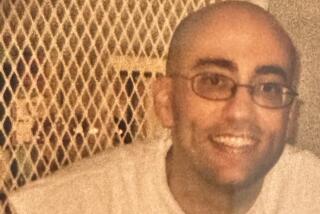Kraft Lawyer Says Execution Would Be ‘More Violence’
- Share via
A lawyer for Randy Steven Kraft told jurors shortly before they began deliberations Tuesday that if the convicted serial killer is executed, “the only thing it would accomplish would be more violence; another family would lose a loved one, another mother will bury another son.”
C. Thomas McDonald, in closing remarks in the two-month-long death penalty hearing, relied heavily on defense psychiatric tests that showed Kraft suffered from brain abnormalities.
“If we stand for anything that is real, we don’t kill people who have brain damage,” McDonald argued in a Santa Ana courtroom.
The jurors, who convicted Kraft three months ago of 16 Orange County murders, today will begin their first full day of deliberations on a verdict of death or life in prison without parole. Their ruling will end the year-long trial that many believe could be one of the most costly in the state’s history.
Superior Court Judge Donald A. McCartin sent them into the jury room Tuesday afternoon to begin deliberations. But after choosing a foreman, they told the judge that they preferred to go home and start fresh in the morning. McCartin, who sequestered the panel at an area hotel during the trial’s guilt-phase deliberations, chose not to sequester them this time.
The jurors had heard closing arguments Monday from Deputy Dist. Atty. Bryan F. Brown, who told them that Kraft killed his victims for his own evil, sexual pleasure.
Kraft, now 44, a computer consultant from Long Beach, has denied killing anyone.
All of the victims were young men, most between the ages of 18 and 25. The bodies of most of them showed signs of sexual mutilation or sexual abuse and were dumped along freeway ramps or in remote areas. Besides the 16 murders in the guilt phase of the trial, the prosecutor linked Kraft to eight more homicides in the penalty phase: six in Oregon and two in Michigan.
On Tuesday, both McDonald and defense co-counsel James G. Merwin argued to the jurors that they couldn’t help but think that there had to be questions left unanswered about Kraft’s guilt on some of the homicides.
Merwin’s role was to raise doubts about Kraft’s guilt in the Oregon and Michigan homicides, which were added to the case in the penalty phase to help support the prosecution’s request for the death penalty.
The jurors will not return verdicts on Kraft’s guilt in any of those homicides. But under the law, they can consider those eight other homicides in deciding a death verdict if they are convinced beyond a reasonable doubt that Kraft is guilty of them.
On Tuesday, Merwin also raised questions about some of the 16 murders the same jury already has convicted Kraft of committing. He told jurors that he is still perplexed about their decision to find Kraft guilty of killing 22-year-old Mark Howard Hall, whose body was found in a remote area on Jan. 3, 1976. Kraft’s fingerprints were found at the scene, but his lawyers have argued that the Hall killing was too much unlike the other murders.
“Maybe I’m naive or maybe I’m just too close to this case,” Merwin said, “but I find it hard to believe that even as you were voting that Mr. Kraft was guilty that you didn’t have some doubt as to who actually killed Hall. I constantly think back to Hall when I think about this case.”
McDonald asked aloud whether Kraft might be covering up for someone. Or did his brain damage affect his memory?
“I don’t have the answers,” McDonald said. “But these answers, these clues, are going to be snuffed out if you don’t vote for life (without parole). The origins of these crimes, the potential cures for these crimes, are going to extinguish with Randy’s life.”
McDonald’s primary argument for jurors, however, was against the death penalty itself on moral grounds. He quoted his 74-year-old mother, when he sought her advice on what to say: “She said, ‘Tommy’--I’m 47 years old and she still calls me Tommy--’there has to be a better way.’ ”
“The use of the power to kill has never elevated us,” McDonald added. “ . . . The violence has to stop. Killing Randy is wrong.”
Jurors deliberated a full two weeks before finding Kraft guilty of first-degree murder in all 16 murder charges against him. Speculation was rampant Tuesday among court watchers and some people connected with the case about how long jurors will take to decide the single issue verdict of death vs. life without parole.
“It’s either going to be one day or one week,” said one person involved in the case who preferred not to be named. “It all depends on how they decide to go about it.”
More to Read
Sign up for Essential California
The most important California stories and recommendations in your inbox every morning.
You may occasionally receive promotional content from the Los Angeles Times.










